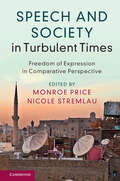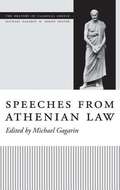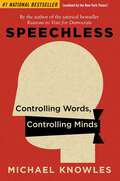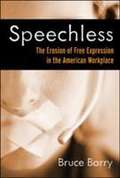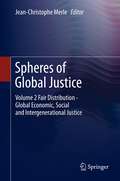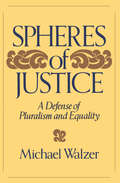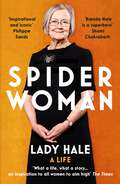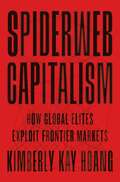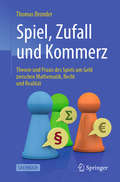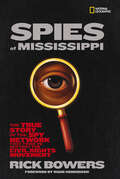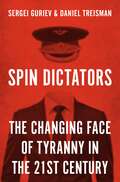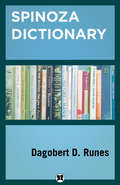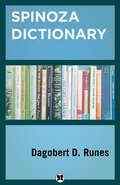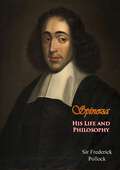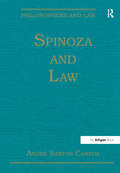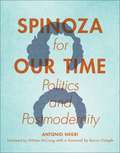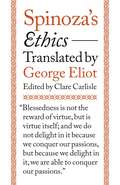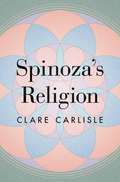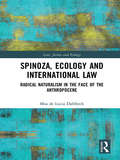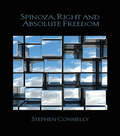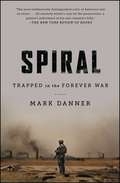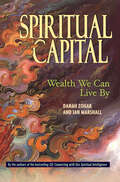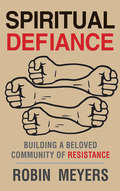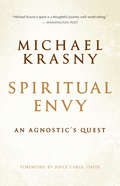- Table View
- List View
Speech and Society in Turbulent Times: Freedom of Expression in Comparative Perspective
by Monroe Price Nicole StremlauThis volume explores how societies are addressing challenging questions about the relationship between expression, traditional and societal values, and the transformations introduced by new information communications technologies. It seeks to identify alternative approaches to the role of speech and expression in the organization of societies as well as efforts to shape the broader global information society. How have different societies or communities drawn on the ideas of philosophers, religious leaders or politicians, both historical and contemporary, that addressed questions of speech, government, order or freedoms and applied them, with particular attention to applications in the digital age? The essays include a wide variety of cultural and geographic contexts to identify different modes of thinking. The goal is to both unpack the 'normative' internet and free expression debate and to deepen understanding about why certain internet policies and models are being pursued in very different local or national contexts as well as on a global level.
Speeches From Athenian Law
by Michael GagarinThis is the sixteenth volume in the Oratory of Classical Greece. This series presents all of the surviving speeches from the late fifth and fourth centuries BC in new translations prepared by classical scholars who are at the forefront of the discipline. These translations are especially designed for the needs and interests of today's undergraduates, Greekless scholars in other disciplines, and the general public. Classical oratory is an invaluable resource for the study of ancient Greek life and culture. The speeches offer evidence on Greek moral views, social and economic conditions, political and social ideology, law and legal procedure, and other aspects of Athenian culture that have recently been attracting particular interest: women and family life, slavery, and religion, to name just a few. This volume assembles twenty-one speeches previously published in the Oratory series. The speeches are taken from a wide range of different kinds of cases-homicide, assault, commercial law, civic status, sexual offenses, and others-and include many of the best-known speeches in these areas. They are Antiphon, Speeches 1, 2, 5, and 6; Lysias 1, 3, 10-11, 23, 24, and 32; Isocrates 17; Isaeus 11; Hyperides 3; Demosthenes 21, 35, 54, 55, 57, and 59; and Aeschines 1. The volume is intended primarily for use in teaching courses in Greek law or related areas such as Greek history. It also provides the introductions and notes that originally accompanied the individual speeches, revised slightly to shift the focus onto law.
Speechless: Controlling Words, Controlling Minds
by Michael Knowles&“Every single American needs to read Michael Knowles&’s Speechless. I don&’t mean &‘read it eventually.&’ I mean: stop what you&’re doing and pick up this book.&” —CANDACE OWENS "The most important book on free speech in decades—read it!&” —SENATOR TED CRUZ A New Strategy: We Win, They Lose The Culture War is over, and the culture lost. The Left&’s assault on liberty, virtue, decency, the Republic of the Founders, and Western civilization has succeeded. You can no longer keep your social media account—or your job—and acknowledge truths such as: Washington, Jefferson, and Columbus were great men. Schools and libraries should not coach children in sexual deviance. Men don&’t have uteruses. How did we get to this point? Michael Knowles of The Daily Wire exposes and diagnosis the losing strategy we have fallen for and shows how we can change course—and start winning. In the groundbreaking Speechless: Controlling Words, Controlling Minds Knowles reveals: How the &“free speech absolutists&” gave away the store The First Amendment does not require a value-neutral public square How the Communists figured out that their revolution could never succeed as long as the common man was attached to his own culture Where political correctness came from How, comply or resist, political correctness is a win-win game for the bad guys Why taking our stand on &“freedom of speech&” helps put atheism, decadence, and nonsense on the same plane with faith, virtue, and reality The real question: Will we shut down drag queen story hour, or cancel Abraham Lincoln? For 170 years the First Amendment was compatible with prayer in public school How the atheists got the Warren Court to rule their way To this day, there&’s a First Amendment exception for obscenity. What exactly is the argument that perverts&’ teaching toddlers to twerk is not obscene? Read Speechless: Controlling Words, Controlling Minds if you want to learn how to take the fight to the enemy.
Speechless: The Erosion of Free Expression in the American Workplace
by Bruce BarryA factory worker is fired because her boss dislikes the political bumper sticker on her car in the parking lot. Another is canned after refusing to display an American flag at his workstation.
Spheres of Global Justice: Volume 1 Global Challenges to Liberal Democracy. Political Participation, Minorities and Migrations; Volume 2 Fair Distribution - Global Economic, Social and Intergenerational Justice
by Jean-Christophe MerleSpheres of Global Justice analyzes six of the most important and controversial spheres of global justice, each concerning a specific global social good. These spheres are democratic participation, migrations, cultural minorities, economic justice, social justice, and intergenerational justice. Together they constitute two constellations dealt with, in this collection of essays by leading scholars, in two different volumes: Global Challenges to Liberal Democracy and Fair Distribution. These essays illustrate each of the spheres, delving into their differences, commonalities, collisions and interconnections. Unlike many writings on global justice, Spheres of Global Justice does not content itself with describing the painful and advantageous effects of the globalization process as being ipso facto a global injustice or a just global order. Rather, this multidisciplinary collection of essays, from a pluralist inspiration, combines empirical analysis with theoretical approaches and ethical principles, paying close attention to two aspects of the effects of the globalization process. These aspects are the causal relationships that lead to such effects and the kinds of obligations, or of normative relationships between global rights and correlative duties, that applies to each specific individual case. This volume illustrates how diverse global obligations are, and how they can be, grounded in diverse relationships (identity, ability to provide help, causal responsibility, past injustices, protection of agency and promotion of independence, etc.). These essays also demonstrate that an ethical global approach has not only international or transnational, but also domestic, local and interpersonal dimensions.
Spheres of Justice: A Defense of Pluralism and Equality
by Michael WalzerThe distinguished political philosopher and author of the widely acclaimed Just and Unjust Wars analyzes how society distributes not just wealth and power but other social "goods" like honor, education, work, free time--even love.
Spider Woman: A Life – by the former President of the Supreme Court
by Lady HaleLady Hale is an inspirational figure admired for her historic achievements and for the causes she has championed. Spider Woman is her story. As 'a little girl from a little school in a little village in North Yorkshire', she only went into the law because her headteacher told her she wasn't clever enough to study history. She became the most senior judge in the country but it was an unconventional path to the top. How does a self-professed 'girly swot' get ahead in a profession dominated by men? Was it a surprise that the perspectives of women and other disadvantaged groups had been overlooked, or that children's interests were marginalised? A lifelong smasher of glass-ceilings, who took as her motto 'women are equal to everything', her landmark rulings in areas including domestic violence, divorce, mental health and equality were her attempt to correct that. As President of the Supreme Court, Lady Hale won global attention in finding the 2019 prorogation of Parliament to be unlawful. Yet that dramatic moment was merely the pinnacle of a career throughout which she was hailed as a pioneering reformer. Wise, warm and inspiring, Spider Woman shows how the law shapes our world and supports us in crisis. It is the story of how Lady Hale found that she could overcome the odds, which shows that anyone from similar beginnings will find that they can cope too.
Spiderweb Capitalism: How Global Elites Exploit Frontier Markets
by Kimberly Kay HoangA behind-the-scenes look at how the rich and powerful use offshore shell corporations to conceal their wealth and make themselves richerIn 2015, the anonymous leak of the Panama Papers brought to light millions of financial and legal documents exposing how the superrich hide their money using complex webs of offshore vehicles. Spiderweb Capitalism takes you inside this shadow economy, uncovering the mechanics behind the invisible, mundane networks of lawyers, accountants, company secretaries, and fixers who facilitate the illicit movement of wealth across borders and around the globe.Kimberly Kay Hoang traveled more than 350,000 miles and conducted hundreds of in-depth interviews with private wealth managers, fund managers, entrepreneurs, C-suite executives, bankers, auditors, and other financial professionals. She traces the flow of capital from offshore funds in places like the Cayman Islands, Samoa, and Panama to special-purpose vehicles and holding companies in Singapore and Hong Kong, and how it finds its way into risky markets onshore in Vietnam and Myanmar. Hoang reveals the strategies behind spiderweb capitalism and examines the moral dilemmas of making money in legal, financial, and political gray zones.Dazzlingly written, Spiderweb Capitalism sheds critical light on how global elites capitalize on risky frontier markets, and deepens our understanding of the paradoxical ways in which global economic growth is sustained through states where the line separating the legal from the corrupt is not always clear.
Spiel, Zufall und Kommerz: Theorie und Praxis des Spiels um Geld zwischen Mathematik, Recht und Realität
by Thomas BronderDas Spiel mit dem Glück Von Brett- und Kartenspielen über Glücksspielautomaten bis hin zu Lotterien und Wettbüros – dieses Buch ist ebenso breit angelegt wie die Welt des Spiels und zeigt, was all diesen Spielen gemeinsam ist und wie sie wirklich funktionieren. Dabei geht um den Vergleich diverser Spielsysteme anhand wertneutraler Merkmale insbesondere zum Unterschied von Glücks- und Geschicklichkeitsspielen. Wo regieren der Zufall und der Kommerz, wo die Geschicklichkeit? Wie greifen sie ineinander, und welchen rechtlichen Regelungen unterliegt das kommerzielle Spiel? Was macht den besonderen Reiz der Pokerspiele aus? Viele Beispiele zeichnen historische Entwicklungen nach, Zusammenhänge und Gesetze der Wahrscheinlichkeitstheorie werden anschaulich erklärt und lange Spielfolgen bis zum „Point of no return“ bildlich dargestellt. Thomas Bronder räumt außerdem mit vielen Irrtümern, ungenauen Begriffsvorstellungen und Missverständnissen auf, etwa zu Chancengleichheit, Verlusttempo und Auszahlquoten. Vom erfolgreichen Buchmachen über erfolglose Gewinnsysteme bis zu Schneeballsystemen, Falschspiel, Betrug und Manipulation wird kein Thema ausgelassen. So liegt hiermit nun eine kleine „Bibel“ des Spiels um Geld vor, die nicht nur für Spieler, Journalisten und Juristen interessant ist.Die zweite Auflage enthält viele Ergänzungen und Korrekturen mit einem umfangreichen Sachwortverzeichnis zum Nachschlagen. Sie teilt Nullsummenspiele in fünf Klassen ein, beschreibt Besonderheiten beim Pokern und geht auf die Probleme mit Online-Glücksspielen im Internet ein.
Spies of Mississippi: The True Story of the Spy Network that Tried to Destroy the Civil Rights Movement
by Rick BowersThe Spies of Mississippi is a compelling story of how state spies tried to block voting rights for African Americans during the Civil Rights era. This book sheds new light on one of the most momentous periods in American history.Author Rick Bowers has combed through primary-source materials and interviewed surviving activists named in once-secret files, as well as the writings and oral histories of Mississippi civil rights leaders. Readers get first-hand accounts of how neighbors spied on neighbors, teachers spied on students, ministers spied on church-goers, and spies even spied on spies.The Spies of Mississippi will inspire readers with the stories of the brave citizens who overcame the forces of white supremacy to usher in a new era of hope and freedom—an age that has recently culminated in the election of Barack Obama
Spin Dictators: The Changing Face of Tyranny in the 21st Century
by Daniel Treisman Sergei GurievHow a new breed of dictators holds power by manipulating information and faking democracyHitler, Stalin, and Mao ruled through violence, fear, and ideology. But in recent decades a new breed of media-savvy strongmen has been redesigning authoritarian rule for a more sophisticated, globally connected world. In place of overt, mass repression, rulers such as Vladimir Putin, Recep Tayyip Erdogan, and Viktor Orbán control their citizens by distorting information and simulating democratic procedures. Like spin doctors in democracies, they spin the news to engineer support. Uncovering this new brand of authoritarianism, Sergei Guriev and Daniel Treisman explain the rise of such “spin dictators,” describing how they emerge and operate, the new threats they pose, and how democracies should respond.Spin Dictators traces how leaders such as Singapore’s Lee Kuan Yew and Peru’s Alberto Fujimori pioneered less violent, more covert, and more effective methods of monopolizing power. They cultivated an image of competence, concealed censorship, and used democratic institutions to undermine democracy, all while increasing international engagement for financial and reputational benefits. The book reveals why most of today’s authoritarians are spin dictators—and how they differ from the remaining “fear dictators” such as Kim Jong-un and Bashar al-Assad, as well as from masters of high-tech repression like Xi Jinping.Offering incisive portraits of today’s authoritarian leaders, Spin Dictators explains some of the great political puzzles of our time—from how dictators can survive in an age of growing modernity to the disturbing convergence and mutual sympathy between dictators and populists like Donald Trump.
Spin Dictators: The Changing Face of Tyranny in the 21st Century
by Daniel Treisman Sergei GurievHow a new breed of dictators holds power by manipulating information and faking democracyHitler, Stalin, and Mao ruled through violence, fear, and ideology. But in recent decades a new breed of media-savvy strongmen has been redesigning authoritarian rule for a more sophisticated, globally connected world. In place of overt, mass repression, rulers such as Vladimir Putin, Recep Tayyip Erdogan, and Viktor Orbán control their citizens by distorting information and simulating democratic procedures. Like spin doctors in democracies, they spin the news to engineer support. Uncovering this new brand of authoritarianism, Sergei Guriev and Daniel Treisman explain the rise of such “spin dictators,” describing how they emerge and operate, the new threats they pose, and how democracies should respond.Spin Dictators traces how leaders such as Singapore’s Lee Kuan Yew and Peru’s Alberto Fujimori pioneered less violent, more covert, and more effective methods of monopolizing power. They cultivated an image of competence, concealed censorship, and used democratic institutions to undermine democracy, all while increasing international engagement for financial and reputational benefits. The book reveals why most of today’s authoritarians are spin dictators—and how they differ from the remaining “fear dictators” such as Kim Jong-un and Bashar al-Assad, as well as from masters of high-tech repression like Xi Jinping.Offering incisive portraits of today’s authoritarian leaders, Spin Dictators explains some of the great political puzzles of our time—from how dictators can survive in an age of growing modernity to the disturbing convergence and mutual sympathy between dictators and populists like Donald Trump.
Spinoza Dictionary
by Dagobert D. RunesIn this work, Baruch Spinoza, one of the cardinal thinkers of all times, answers the eternal questions of man and his passions, and God and nature. In the deepest sense, this dictionary of Spinoza's philosophy is a veritable treasury of sublime wisdom. In his introduction, Dagobert D. Runes, a life-long student of the philosopher, sheds new light on Spinoza's private, political and religious life, and exposes and explains the dramatic story of his apostasy. If the reader despairs of the business of finding his way through Spinoza's works, here he will find a reliable guide speaking in Spinoza's own words. "The grand ideas of Spinoza's Ethics are brought out clearly in this book: not less than the heroic illusions of this great and passionate man." --Albert Einstein
Spinoza Dictionary
by Dagobert D. RunesThis A-to-Z reference volume presents definitions, propositions, and explanations of Spinoza&’s thought—all in the philosopher&’s own words. The seventeenth-century philosopher Baruch Spinoza remains one of the most significant thinkers of our time. Yet his works, written in a rigidly geometric form of argumentation, are notoriously difficult to navigate. Expertly edited by Dagobert D. Runes, Spinoza Dictionary presents an alphabetical selection of Spinoza&’s own writings, making essential definitions, concepts, and passages immediately accessible. In his introduction, Runes sheds new light on Spinoza&’s private, political, and religious life, and exposes and explains the dramatic story of his apostasy. If the reader despairs of finding his way through Spinoza&’s works, here he will find a reliable guide speaking in Spinoza&’s own words. &“The grand ideas of Spinoza&’s Ethics are brought out clearly in this book: not less than the heroic illusions of this great and passionate man.&” —Albert Einstein
Spinoza His Life and Philosophy [2nd Edition]
by Sir Frederick Pollock Johannes ColerusSir Frederick Pollock (1845-1937), Corpus Professor of Jurisprudence at the University of Oxford, is best known as the founding editor of the Law Quarterly Review, and for his correspondence with Justice Oliver Wendell Holmes of the US Supreme Court. This biography of the Dutch philosopher Spinoza (1632-1677) was designed to be accessible to the general reader as well as 'critical students of philosophy’,This second edition includes “The life of Spinoza, by Colerus”.
Spinoza and Law
by AndreSantos CamposThis volume collects some of the best writings on Spinoza�s philosophy of law and includes a critical examination of Spinoza�s theory of the types of law, his natural law theory, as well as the modern reformulation of his approach to the nature of laws and to natural rights. This collection of essays (some of which are published in the English language for the very first time) shows how Spinoza was able to deliver a revolutionary idea of natural law that breaks away from the traditions of natural law and of legal positivism. The bulk of Spinoza�s references to law derive from his metaphysical and political texts, but they have sufficient depth in order to form a groundbreaking theory of law that has been somewhat neglected by modern jurisprudence. The volume also features an introduction which places Spinoza�s writings in the context of modern jurisprudence as well as an extensive bibliography. It is suited to the needs of jurisprudence scholars, teachers and students and is an essential resource for all law libraries; it is also essential to anybody who wishes to engage in Spinoza studies nowadays, whose practical philosophy has received a recent boom in attention by readers throughout the world.
Spinoza for Our Time: Politics and Postmodernity (Insurrections: Critical Studies in Religion, Politics, and Culture)
by Antonio NegriAntonio Negri, one of the world's leading scholars on Baruch Spinoza (1632–1677) and his contemporary legacy, offers a straightforward explanation of the philosopher's elaborate arguments and a persuasive case for his ongoing relevance. Responding to a resurgent interest in Spinoza's thought and its potential application to contemporary global issues, Negri demonstrates the thinker's special value to politics, philosophy, and related disciplines.Negri's work is both a return to and an advancement of his initial affirmation of Spinozian thought in The Savage Anomaly. He further defends his understanding of the philosopher as a proto-postmodernist, or a thinker who is just now, with the advent of the postmodern, becoming contemporary. Negri also connects Spinoza's theories to recent trends in political philosophy, particularly the reengagement with Carl Schmitt's "political theology," and the history of philosophy, including the argument that Spinoza belongs to a "radical enlightenment." By positioning Spinoza as a contemporary revolutionary intellectual, Negri addresses and effectively defeats twentieth-century critiques of the thinker waged by Jacques Derrida, Alain Badiou, and Giorgio Agamben.
Spinoza's Ethics
by Benedictus de SpinozaAn authoritative edition of George Eliot's elegant translation of Spinoza's greatest philosophical workIn 1856, Marian Evans completed her translation of Benedict de Spinoza's Ethics while living in Berlin with the philosopher and critic George Henry Lewes. This would have become the first edition of Spinoza's controversial masterpiece in English, but the translation remained unpublished because of a disagreement between Lewes and the publisher. Later that year, Evans turned to fiction writing, and by 1859 she had published her first novel under the pseudonym George Eliot. This splendid edition makes Eliot's translation of the Ethics available to today's readers while also tracing Eliot's deep engagement with Spinoza both before and after she wrote the novels that established her as one of English literature's greatest writers.Clare Carlisle's introduction places the Ethics in its seventeenth-century context and explains its key philosophical claims. She discusses George Eliot's intellectual formation, her interest in Spinoza, the circumstances of her translation of the Ethics, and the influence of Spinoza's ideas on her literary work. Carlisle shows how Eliot drew on Spinoza's radical insights on religion, ethics, and human emotions, and brings to light surprising affinities between Spinoza's austere philosophy and the rich fictional worlds of Eliot's novels.This authoritative edition demonstrates why George Eliot's translation remains one of the most compelling and philosophically astute renderings of Spinoza's Latin text. It includes notes that indicate Eliot's amendments to her manuscript and that discuss her translation decisions alongside more recent English editions.
Spinoza's Religion: A New Reading of the Ethics
by Clare CarlisleA bold reevaluation of Spinoza that reveals his powerful, inclusive vision of religion for the modern ageSpinoza is widely regarded as either a God-forsaking atheist or a God-intoxicated pantheist, but Clare Carlisle says that he was neither. In Spinoza’s Religion, she sets out a bold interpretation of Spinoza through a lucid new reading of his masterpiece, the Ethics. Putting the question of religion centre-stage but refusing to convert Spinozism to Christianity, Carlisle reveals that “being in God” unites Spinoza’s metaphysics and ethics. Spinoza’s Religion unfolds a powerful, inclusive philosophical vision for the modern age—one that is grounded in a profound questioning of how to live a joyful, fully human life.Like Spinoza himself, the Ethics doesn’t fit into any ready-made religious category. But Carlisle shows how it wrestles with the question of religion in strikingly original ways, responding both critically and constructively to the diverse, broadly Christian context in which Spinoza lived and worked. Philosophy itself, as Spinoza practiced it, became a spiritual endeavor that expressed his devotion to a truthful, virtuous way of life. Offering startling new insights into Spinoza’s famously enigmatic ideas about eternal life and the intellectual love of God, Carlisle uncovers a Spinozist religion that integrates self-knowledge, desire, practice, and embodied ethical life to reach toward our “highest happiness”—to rest in God.Seen through Carlisle’s eyes, the Ethics prompts us to rethink not only Spinoza but also religion itself.
Spinoza, Ecology and International Law: Radical Naturalism in the Face of the Anthropocene (Law, Justice and Ecology)
by Moa De Lucia DahlbeckThis book addresses the use of Benedict Spinoza’s philosophy in current attempts to elaborate an ecological basis for international environmental law. Because the question of environmental protection has not been satisfactory resolved, the legal debate concerning our responsibility for the environment has – as evidenced in the recent UN report series Harmony with Nature – come to invite calls for a new eco-centric, rather than anthropocentric, legal paradigm. In this respect, Spinoza appears as a key figure. He is one of the few philosophers in the history of western philosophy who cares, and writes extensively, about the roots of anthropocentrism; the core issue of contemporary normative debates in ecology. And in response to the rapidly developing ecological crisis, his work has become central to a re-thinking of the human relationship with nature. Addressing the contention that Spinoza’s ethics might provide a useful source for developing a new, eco-centred framework for environmental law, this book elaborates a more nuanced understanding of Spinoza’s philosophy. Spinoza cannot, it is argued here, simply be reduced to an eco-ethicist. That is: his metaphysics cannot be used as basis of an essentially naturalised or extended human morality. At the same time, however, this book argues that the radicality of Spinoza’s naturalism nevertheless offers the possibility of developing a more adequate ecological basis for environmental law.
Spinoza, Right and Absolute Freedom: Spinoza, Right And Absolute Freedom (Birkbeck Law Press)
by Stephen ConnellyAgainst jurisprudential reductions of Spinoza’s thinking to a kind of eccentric version of Hobbes, this book argues that Spinoza’s theory of natural right contains an important idea of absolute freedom, which would be inconceivable within Hobbes’ own schema. Spinoza famously thought that the universe and all of the beings and events within it are fully determined by their causes. This has led jurisprudential commentators to believe that Spinoza has no room for natural right – in the sense that whatever happens by definition has a ‘right’ to happen. But, although this book demonstrates how Spinoza constructs a system in which right is understood as the work of machines, by fixing right as determinate and invariable, Stephen Connolly argues that Spinoza is not limiting his theory. The universe as a whole is capable of acting only in determinate ways but, he argues, for Spinoza these exist within a field of infinite possibilities. In an analysis that offers much to ongoing attempts to conceive of justice post-foundationally, the argument of this book is that Spinoza opens up right to a future of determinate interventions –as when an engineer, working with already-existing materials, improves a machine. As such, an idea of freedom emerges in Spinoza: as the artful rearrangement of the given into new possibilities. An exciting and original contribution, this book is an invaluable addition, both to the new wave of interest in Spinoza’s philosophy, and to contemporary legal and political theory.
Spiral: Trapped in the Forever War
by Mark Danner"[A] chilling cautionary tale of Orwellian repercussions." --Kirkus Reviews Trapped in a forever war by 9/11, in Spiral Mark Danner describes a nation that has been altered in fundamental ways. President Bush declared a war of choice and without an exit plan, and President Obama has proven unable to take the country off what he has called its "permanent war footing."The War on Terror has led to fourteen years of armed conflict, the longest war in America's history. Al Qaeda, the organization that attacked us on 9/11, has been "decimated" (the word is Obama's) but replaced by multiple jihadist and terror organizations, including the most notorious--ISIS. Spiral is what we can call a perpetual and continuously widening war that has put the country in a "state of exception." Bush's promise that we have "taken the gloves off" and Obama's inability to define an end game have had a profound effect on us even though the actual combat is fought by a tiny percentage of our citizens. In the name of security, some of our accustomed rights and freedoms are circumscribed. Guantanamo, indefinite detention, drone warfare, enhanced interrogation, torture, and warrantless wiretapping are all words that have become familiar and tolerated. And yet the war goes badly as the Middle East drowns in civil wars and the Caliphate expands and brutalized populations flee and seek asylum in Europe. In defining the War on Terror as boundless, apocalyptic, and unceasing, we have, Danner concludes, "let it define us as ideological crusaders caught in an endless war."
Spiritual Capital: Wealth We Can Live by
by Danah Zohar Ian MarshallOur world is at a crossroads; we must choose between two alternatives. The first is capitalism as we know it today-an amoral culture of short-term self-interest, profit maximization, emphasis on shareholder value, isolationist thinking, and profligate disregard of long-term consequences. Based on narrow assumptions about human nature and motivation, this system is unsustainable, a monster set to consume itself. The second alternative is "spiritual capital"-a values-based business culture in which wealth is accumulated in order to generate a decent profit while acting to raise the common good. Rather than emphasizing shareholder value, spiritual capital emphasizes "stakeholder value," where stakeholders include the whole human race, present and future, and the planet itself. Spiritual capital nourishes and sustains the human spirit. The crucial question is how we can move from one alternative to the other-how we can move from present-day business capitalism to Spiritual Capital. Danah Zohar and Ian Marshall introduce the concept of spiritual intelligence (SQ), and describe how it can be used to shift individuals and our culture from a state of acting from lower motivations (fear, greed, anger, and self-assertion) to one of acting from higher motivations (exploration, cooperation, power-within, mastery, and higher service). Zohar and Marshall describe how this shift actually happens a given organizational culture. They look in depth at the issues that dominate corporate culture and how they are influenced by the processes of SQ transformation and discuss the leadership elite who must be the ones to bring about and embody this cultural shift. Finally, Zohar and Marshall argue that spiritual capital is still a valid and workable form of capitalism and detail what we, as individuals, can do to make it happen.
Spiritual Defiance
by Robin MeyersDuring his thirty-year career as a parish minister and professor, Robin Meyers has focused on renewing the church as an instrument of social change and personal transformation. In this provocative and passionate book, he explores the decline of the church as a community of believers and calls readers back to the church's roots as a community of resistance. Shifting the conversation about church renewal away from theological purity and marketing strategies that embrace cultural norms, and toward "embodied noncompliance" with the dominant culture, Meyers urges a return to the revolutionary spirit that marked Jesus's ministry. Framing his discussion around three poems by twentieth-century Polish poet Anna Kamienska, Meyers casts the nature of faith as a force that stands against anything and everything that engenders death and indignity. He calls for active--sometimes even subversive--defiance of the ego's temptations, of what he terms "the heresy of orthodoxy itself," and of an uncritical acceptance of militarism and capitalism. Each chapter is a poignant and urgent invitation to recover the Jesus Movement as a Beloved Community of Resistance.
Spiritual Envy
by Michael KrasnyAs the host of one of National Public Radio's most popular interview programs, Michael Krasny has spent decades leading conversations on every imaginable topic and discussing life's most important questions with the foremost thinkers of our time. Now he brings his wide-ranging knowledge and perceptive intelligence to a thoughtful and thought-provoking exploration of belief; and lack of belief. Many books and pundits advocate for a specific God, while others adamantly declare there is no God. Yet these strident viewpoints often speak right past each other, rarely convincing anyone but the already convinced. In -- Spiritual Envy -- Krasny helps believers and nonbelievers alike understand their own questions about faith and religion, about God and human responsibility. Krasny challenges each of us to look closely at faith and its power, and to examine the positive and negative aspects of religion as expressed in culture, literature, and human relationships. Personal and universal, timely and timeless, this is a deeply wise yet warmly welcoming conversation, an invitation to ask one's own questions; no matter how inconclusive the answers.
